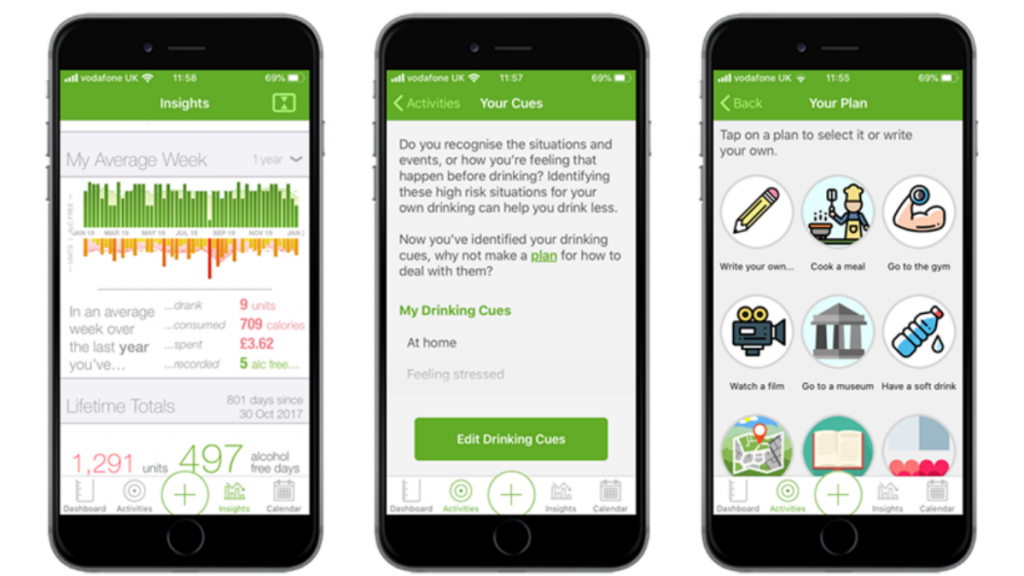Refining digital health interventions: the case of Drink Less
| 26 May, 2022 | Dr. Claire Garnett |
|

|

Digital health interventions (DHIs) have great potential to have a positive impact on health and healthcare delivery. What process can researchers follow to enable DHIs to reach their full potential? Here, Dr. Claire Garnett (Senior Research Fellow, University College London) discusses the creation and refinement process of ‘Drink Less’, an alcohol reduction app.
Claire, thank you for taking the time to talk to us about your work. Can you tell us about your field of research?
I’m a Senior Research Fellow at University College London (UCL) in the Tobacco and Alcohol Research Group. My field of research is alcohol and smoking cessation, focusing on the use of digital technologies to support behavior change and the population level influences on these behaviors. Behavioral science and theory underpin my research, and I have a background in health psychology. My latest Research Article on F1000Research details the process of refining Drink Less to improve its usability and likely effectiveness.
What inspired you to create Drink Less, and how is it different from other alcohol reduction apps available?
Digital health interventions, such as apps, can provide people who drink at high-risk levels with easily accessible support. Such interventions can help them reduce their alcohol consumption by removing many barriers to receiving face-to-face support. However, a previous study found that most alcohol reduction apps were developed without reference to scientific evidence or theory. In response to this, we developed the Drink Less app based on scientific evidence and behavior change theories. It was developed iteratively by a team of researchers with input from users, and we continued to refine and evaluate the app.
How did you approach refining Drink Less?
We used a mixed-methods approach to the refinement of Drink Less, and the process consisted of three main phases:
1) Identifying changes to the content of the app.
2) Design and translation of new content into app modules.
3) Improving the usability of the app.
We used evidence from as many sources as possible to inform how best to improve the app, including user feedback, findings from a previous app evaluation, and findings from a systematic review of digital alcohol interventions.
An essential part of the refinement process was continuing ongoing maintenance of the app in line with software updates and advances in technology. Many apps developed by academics are only available during a study or are left to ‘rot.’ This is likely to end in a poor user experience and users abandoning the app, which is quite common.
How did you involve users at each stage in creating this digital health intervention?
We conducted usability testing before the first version of the Drink Less app was launched and during the refinement process. We aimed to explore users’ views towards the app and determine whether the content was acceptable and how we might improve it.
In both instances, we used purposive sampling to ensure we had participants of low socioeconomic status suitably represented. This is critical to ensure that digital health interventions, at the very least, don’t make health inequalities worse and can hopefully reduce them.
We also analyzed the content of the user feedback we received (from emails and the App Store reviews) as part of the refinement process. User reviews can provide a rich source of information to support app development from a user perspective but are unlikely to represent most app users. Extremely positive or extremely negative reviews are the most likely to be shared.
Your research resulted in a variety of changes to the app. Can you tell us about some of the most significant changes?
The most significant changes were the addition of three new modules: ‘Insights,’ ‘Your drinking cues,’ and ‘Drinking alternatives.’ ‘Insights’ shows users a more detailed summary of their progress, including their last week, average week, and lifetime totals. We added this module as it was a prevalent feature request in the user feedback.
Furthermore, ‘Your drinking cues’ prompt users to identify situations and events that occur before drinking and to make a plan for how to deal with these cues. The behavior change technique of information about antecedents, which emphasizes the importance of the events immediately before a behavior, informed this refinement.
Finally, ‘Drinking alternatives’ was based on the behavior change technique of behavior substitution and prompted users to make an alternative plan within the app’s drinking calendar. We added ‘Your drinking cues’ and ‘Drinking alternatives’ as we found these factors to be associated with the effectiveness of digital alcohol interventions in an evidence review.

What role do you see open science and open data having in digital health intervention research?
Digital health intervention research is still a relatively new field. An open science approach to research means that our research can be part of a larger collaborative effort beyond our immediate team or institute. As a result, this effort can advance the field more than one team could individually.
Moreover, following the principles of open science, including open data and source code, can also help avoid unnecessary waste and reduce development costs for other researchers. For example, researchers can use the source code of a similar app as a starting point to then build on or change.
What do you hope will be the impact of this Research Article?
We hope that this Research Article provides a valuable template for researchers refining digital behavior change interventions, particularly digital health interventions. Moreover, it highlights the range of methods that can inform the refinement process, along with the importance of using these different methods to triangulate evidence. Furthermore, providing clear and systematic reporting of intervention development and refinement can inform policymakers’ decisions on which interventions to adopt.
What’s next for Drink Less and your research?
We are currently evaluating the effectiveness and cost-effectiveness of the Drink Less app in a randomized controlled trial with an embedded mixed methods process. The study findings will inform whether the app effectively reduces alcohol consumption and if investment in promoting the app is warranted. The project is due to end in February 2023. We will be publishing the results, study materials, anonymized data, and code open access on our project page.
Read the full Research Article, ‘Refining the content and design of an alcohol reduction app, Drink Less, to improve its usability and effectiveness: a mixed methods approach‘ today on F1000Research.

|



User comments must be in English, comprehensible and relevant to the post under discussion. We reserve the right to remove any comments that we consider to be inappropriate, offensive or otherwise in breach of the User Comment Terms and Conditions. Commenters must not use a comment for personal attacks.
Click here to post comment and indicate that you accept the Commenting Terms and Conditions.